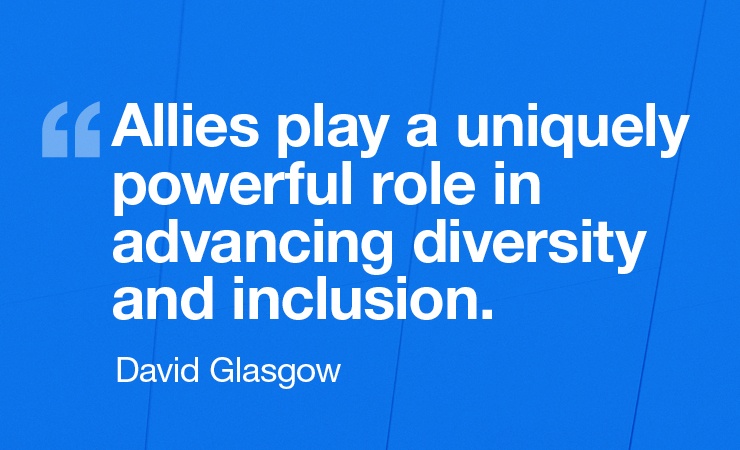Allies As Drivers of LGBTQ Inclusion
Organizations have long relied on straight and cisgender allies in LGBTQ inclusion efforts. Some offer ally certification and training courses and distribute rainbow mugs, flags, pins, and stickers so that workers can advertise their ally status. Yet allyship is not just a branding exercise. Research shows that allies play a uniquely powerful role in advancing diversity and inclusion.
An ally is someone who is not directly targeted by non-inclusive behavior, but nonetheless acts in support of others. Allies help colleagues who feel left out, they confront bias, and they improve systems to make the everyday work environment more inclusive. While commonly used in the LGBTQ context, the term ally is also used for gender inclusion (“male allies”) and increasingly across all demographics.

Allies are powerful drivers of LGBTQ inclusion for three major reasons. First, research in non-LGBTQ contexts suggests that allies are often taken more seriously, and penalized less, than directly affected people when they challenge non-inclusive behavior. A white researcher who confronts people with their implicit racial bias is less likely to be viewed as a “complainer” than a black researcher who does the same. Allies are also considered more persuasive than members of target groups when they advocate for diversity. A study in the Academy of Management Journal suggests that women and minorities receive diminished performance and competence ratings when they promote demographic balance within organizations, but that white men do not. Indeed, the researchers provocatively propose that “organizations seeking to advance the standing of minorities and women might consider having a white male spokesperson for the diversity office.”
Second, allies have the power to transform the lives of individual LGBTQ colleagues. Research by Jennifer Wessel indicates that having one highly supportive coworker may be a greater determinant of whether an LGBTQ employee comes out than having a group of coworkers who are supportive on average.
Finally, the concept of allyship can offer safety to LGBTQ people who do not wish to come out. In my own research with multinational corporations, we found that allyship programs were an effective way to launch LGBTQ inclusion efforts in anti-LGBTQ locations. By framing LGBTQ initiatives as “ally” initiatives, organizations can allow closeted individuals to get involved as “allies” until they feel comfortable coming out.
While allyship is a powerful tool, it is not without risk. We know from studies on disability that behavior allies assumed to be helpful, such as insisting on accompanying a blind person to her destination when she merely asked for directions, can be experienced as patronizing and unhelpful. For that reason, allyship needs to be considered as a set of skills honed through practice rather than a static self-identification.
At the Center for Diversity, Inclusion, and Belonging at NYU School of Law, we conceive of allyship as a three-stage process of maturation. Building on a model proposed by Keith Edwards, we observe that in the first stage, “Ally to One,” allies pay little regard to systemic issues like implicit bias. Instead, they think of allyship as about helping an individual colleague with whom they have a personal connection. In the second stage, “Ally to Some,” allies are focused on helping a marginalized out-group. This dynamic of an exceptional in-group member working for an oppressed out-group can lead to a “savior” complex in which allies think they know what is best for a group, rather than asking for permission or guidance. Allies in this stage are quick to judge others who act non-inclusively, but defensive when confronted with their own non-inclusive behavior.
In our center’s view, organizations should encourage a third stage of allyship, “Ally to All,” in which allies recognize that everyone benefits from a more inclusive workplace, including themselves. While Allies to All acknowledge that some groups experience more barriers than others, they stop thinking in simplistic terms of “us” versus “them,” and are more likely to notice that we all have insider and outsider traits. For that reason, they work alongside people as partners, rather than for people as saviors. They also adopt a more generous posture toward sources of non-inclusive behavior by giving them an opportunity to grow from mistakes.
While the existing literature is encouraging on the power of allies, more research is needed to refine the specific allyship behaviors that are effective in achieving inclusive outcomes. As the three-stage model suggests, some forms of allyship are more beneficial than others. Key questions include: What kinds of interventions are experienced by LGBTQ individuals as helpful? What motivations for engaging in allyship are sustainable? And how can allies be most effective across a power dynamic, such as when a supervisor engages in non-inclusive behavior?
Many organizations treat allyship as a focal point of their diversity and inclusion initiatives. Social science can help them ensure such efforts are evidence-based.



























































































